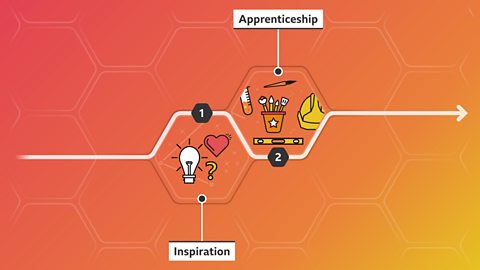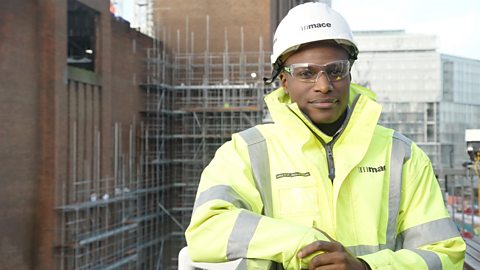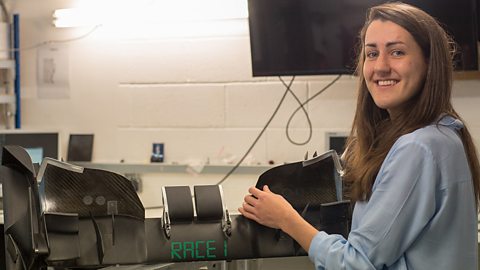I’m on a five-year apprenticeship. I work four days a week on site and one day a week at uni. You gain knowledge from the practical work without the student debt.
I’m Zoe, I’m 21 and I’m an apprentice site engineer.
I joined the construction industry in 2015 as an apprentice. I’ve worked within a team to build a new underground station in the centre of London; one of the largest infrastructure projects in Europe at the moment.
To go on site I have to wear PPE, Personal Protective Equipment. This includes a hard hat, gloves, glasses, a high vis jacket, high vis trousers, and also my steel cap boots. We wear PPE on site because health and safety is super important.
When we were in our heavy construction phase I was out on site every day, marking out where all the walls would go. I’ve then supervised putting in all the reinforcements and then making sure the concrete was poured on time.
Now we’re in the finishing phases, a lot of my time is spent managing our various different sub-contractors on site, making sure that they hit their deadlines.
I’m on a five-year apprenticeship. I work four days a week on site and one day a week at uni.
My father had done an apprenticeship when he first started in the industry. You gain knowledge from the practical work and you don’t have any student debt. So I get paid to go to work and to study.
I’m really proud that I'll be able to bring my friends and family here when it opens and this station will serve people for hundreds of years.
Zoe’s father did an apprenticeship in construction and she was inspired to follow in his footsteps and do the same. After college, she joined a five-year apprenticeship, working for the construction company Laing O’Rourke. This also allows her to go to university one day a week. She gets paid while she learns the role, and feels she has picked up a lot of useful, practical knowledge.
She marks out where walls should go and where concrete should be poured using electrical equipment. She also manages sub-contractors on site, making sure they hit their deadlines.
Zoe enjoys working with a diverse group of people and feels fully supported as she learns new skills. She's looking forward to showing her friends and family the tube station she has helped to build!


What to expect if you want to be an engineer
- How many people work in the engineering sector?
- What can you earn in different roles?
- What routes can you take to get in?
- Is the demand for engineers expected to grow in the future?
Watch the film to find out the answers to these questions, and much more!
Other resources
- See what type of engineering role might suit you with the meet the future you quiz
- Find out more about the different areas of engineering with this guide from Tomorrow's Engineers
- Learn more about roles in engineering with the National Careers Service explore careers tool
- Discover a practical new way to study via T-levels (England-only).
Emma-Louise Have you ever had an idea for an invention, something you thought would make your life easier? If so, you've taken your first steps into engineering something.
Frankie As an engineer, you apply scientific principles to design and help create all sorts of things like buildings, aircrafts, or bras.
Emma-Louise Traditionally, engineering falls in four main categories: chemical, civil, electrical, and mechanical engineering. And, within each of these, there are more specific types of engineering disciplines.
Frankie There were nearly 870,000 engineers in the UK [in 2020], with an estimated 4% growth of just under 40,000 more jobs by 2025.
Emma-Louise You could consider roles such as electrical engineer, chemical engineer, mechanical engineer, nuclear engineer, or software engineer. For electrical engineers,
Frankie people who design, build and maintain electrical systems and equipment,
Emma-Louise there is an expected job growth of just under 1,600 jobs by 2025. As of 2020, the median salary was just over £50,000 per year.
Frankie For civil engineers,
Emma-Louise people who design and manage construction projects, anything from bridges to sports stadiums,
Frankie there's an expected growth of approximately 2,800 jobs by 2025, with a median salary of around £44,500.
Emma-Louise And for mechanical engineers,
Frankie people who develop and design machines that are used in various industries from construction to farming,
Emma-Louise there's an expected growth of just under 2,600 jobs by 2025, with a salary of around £42,000. If you've got a curious mind and love problem solving, engineering could be a good career path for you.
Frankie There are many ways into engineering. The first thing to figure out might be what kind of engineering you're interested in.
Emma-Louise You could consider apprenticeships that are relevant to that role, like a Level 6 Manufacturing Engineer or a Level 6 Electro-mechanical Engineer apprenticeship. These typically take between four and six years to complete.
Frankie Of course, there are also many university courses you could look into. Courses such as Electro-mechanical Engineering, Applied Physics, or Aeronautical Engineering. You would usually need two or three A-levels or equivalent for these, and some of these courses will specify if you need particular A-levels, or the equivalent. Maths and Science subjects are sometimes required.
Emma-Louise There's now more choice as the new T-level qualification is available in England. These two-year courses are equivalent to three A-levels and involve 80% classroom learning and 20% industry placement.
Frankie You can also find out about courses accredited by professional engineering institutions from the Engineering Council.
Emma-Louise Engineers have valuable transferable skills that are handy for other job roles and everyday life, such as problem solving, critical thinking, and working through potential solutions.
Frankie If you've heard things in the past that have made you think engineering is not for you, it might be worth taking a deeper look. Engineers are working on some of the most exciting challenges we face, be it enhancing virtual reality or engineering better medicines. Let's hear from some professionals. Ben is an aerospace engineer. "I love interacting and working with people to find solutions to problems. I enjoy knowing that millions of people fly around the world every year on products that I have helped develop. There's a big push at the moment for more environmentally friendly solutions. Air travel is a massive contributor to global warming and so anything that the industry can do to reduce harmful gases being emitted will make a big impact."
Emma-LouiseDavid, an expert at the Institution of Engineering and Technology, says: "The most exciting thing about engineering and technology is that there will be roles in the next five to 10 years that don't exist yet. Artificial intelligence (AI), coding and ‘green jobs’ – those that work to combat climate change – will continue to evolve and be some of the most important roles within the sector in years to come. It's also really important that the engineering industry is inclusive and representative as engineers, design products and services for everyone."
Emma-Louise Engineering is creative, exciting and not to mention that it pays pretty well once you've worked your way up beyond junior roles. The median wage within the sector is over £41,000, compared to the median full-time salary in the UK which is around £28,500.
Frankie There's also particularly strong growth in software publishing and wireless communications.
Emma-Louise Engineering is also an industry where the gender mix isn't well balanced, although the research is unclear as to why.
Frankie The main shortfall here is engineers who identify as female. As of 2020, 88% of engineers identified as male. However, lots of employers are keen to change this, so there should be more and more opportunities coming up for engineers who identify as female.
Emma-Louise One thing that's for sure is that there are going to be lots of opportunities available in the engineering sector, with just under 40,000 new jobs expected by 2025. So, if this has piqued your interest, then it'll be worth doing some more research to see if this is right for you.
For careers advice in all parts of the UK visit: National Careers Service (England), nidirect (Northern Ireland), My World of Work (Scotland) and Careers Wales (Wales).


Work experience in your area
Find work experience placements with Workfinder.
Tips and advice
Help with interviews, writing a CV and all things work experience related.


How to become an engineer. collection
Find out more about the engineering sector and how those currently working in it got their foot in the door.

Careers in construction. collection
Find out what you could expect from a role in the construction sector.

Amy: Formula 1 engineer
Amy helps develop ways to make racing cars go faster.
